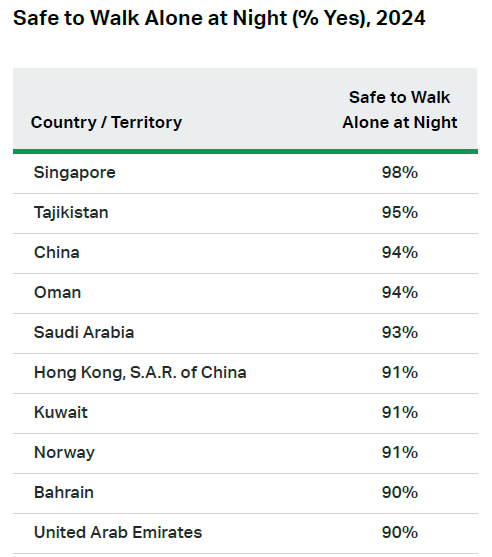As global mobility leaders, you're tasked with one of the most complex challenges in modern business: safely moving talented employees across an increasingly interconnected yet unpredictable world. Gallup's 2025 Global Safety Report offers critical data points that should inform your duty of care strategies and destination assessments.
Key Findings That Matter for Global Mobility
First, you might be surprised that safety perceptions are at a historic high globally - 73% of adults worldwide report feeling safe walking alone at night, the highest level since tracking began in 2006. This represents meaningful progress, but the averages mask significant regional variations that directly impact your assignment planning. Much like real estate, safety is “location, location, location”!
The gender gap persists and demands attention - Women continue to report feeling significantly less safe than men, with only 67% of women feeling safe walking alone at night compared to 78% of men. This 11-point gap appears in 104 of the 144 countries surveyed, highlighting a universal challenge for female assignee safety.
The World's Safest Destinations?
According to Gallup's nighttime safety perceptions, the ten safest countries for walking alone at night are:

Notably, five of these top ten are Gulf Cooperation Council countries, reflecting sustained investment in public safety infrastructure and law enforcement capabilities.
You might be surprised when you look at how the following ranked: United Kingdom, France, India, United States, Canada, Australia, New Zealand and Italy!
Regional Patterns: Where Extra Support May Be Needed
Strongest safety perceptions: Asia-Pacific (79%), Western Europe (77%), and Middle East/North Africa (74%) lead globally.
Areas requiring enhanced support: Sub-Saharan Africa (53%) and Latin America/Caribbean (50%) show the lowest safety perceptions, though both regions demonstrated improvement in 2024.
The South African challenge: South Africa ranks lowest globally at just 33% feeling safe walking alone at night, with neighboring countries (Lesotho, Botswana, Zimbabwe) also in the bottom ten. This concentration suggests regional security challenges requiring specialized mobility support.
Why This Data Matters for Your Programs
Duty of care compliance: Understanding safety perceptions helps you meet legal obligations to provide secure working environments for international assignees. These metrics should inform your destination risk assessments and security protocols.
Female assignee considerations: The persistent gender gap means additional safety measures may be necessary for female employees, particularly in locations where the gap exceeds 20 percentage points (Malaysia, New Zealand, Italy, Malta, and Australia top this list).
Assignment success factors: Employee perceptions of safety directly impact assignment acceptance rates, family adaptation, and overall program success. Locations with higher safety scores typically see better assignee satisfaction and completion rates.
Security budgeting: Countries with lower safety perceptions may require increased security support, from enhanced transportation arrangements to upgraded housing selections, impacting your program costs.
Practical Applications
Consider incorporating this safety perception data alongside traditional risk assessments when evaluating new assignment locations. While perception doesn't always align perfectly with actual crime statistics, it reflects the lived experience your assignees will have.
For existing programs in lower-scoring locations, this data can help justify additional safety investments and inform pre-departure briefings. Female assignees heading to locations with significant gender gaps should receive enhanced security orientations and local support networks.
The report also reinforces the value of ongoing safety communication. Even in high-scoring destinations, maintaining security awareness and support systems remains crucial for comprehensive duty of care.
As the global landscape continues to evolve, data-driven approaches to assignee safety become increasingly vital. This Gallup research provides a valuable baseline for understanding how your employees will experience safety across different destinations - knowledge that's essential for building effective, responsible global mobility programs.
Going deeper
LGBTQ+ employees face significantly heightened risks, with most hiding their identity while traveling. Women continue to experience harassment and safety concerns at disproportionate rates. Here are a few additional resources that reinforce that traditional safety measures are not sufficient for diverse mobile workforces:
A3M Global Monitoring LGBTQ+ Risk Map 2025 A3M Global Monitoring, in cooperation with Diversity Tourism and ITB Berlin, published the LGBTQ+ Risk Map 2025, a world map to assess the safety for travelers from the LGBTQ+ community. This comprehensive resource provides a five-level risk assessment system and highlights:
- Iceland, Norway, Malta, and Uruguay as top safe destinations
- Over 60 countries still criminalize consensual same-sex relations
- Legal frameworks often differ significantly from social acceptance
World Travel Protection Survey (2025) More than half (52 percent) of employees say that traveling for work as a member of the LGBTQ+ community feels less safe compared to their heterosexual or cisgender colleagues, according to a new report from World Travel Protections. Key findings include:
- Only 13 percent of travelers say that their place of work provides LGBTQ+ specific pre-travel information for trips abroad
- 61 countries still criminalize homosexuality in some form
SAP Concur Global Business Travel Survey 82% of LGBTQ business travellers changed their accommodation in 2022 and 2023 due to safety concerns. The research emphasizes the need for comprehensive LGBTQ+ travel safety data across 233 destinations.
Raconteur's Business Travel Safety Report (March 2025) Women report feeling less safe than their male colleagues when travelling for work. The report emphasizes that women face a unique set of considerations when it comes to personal safety on the road – whether that's travelling alone at night, navigating unfamiliar destinations or choosing suitable accommodation.
Executive Assistant Campus Duty of Care Guide (January 2025) Women face unique challenges and risks when traveling for work and this guide recommends prioritizing hotels with strong safety features and creating tailored travel plans that account for individual safety concerns.
These 2025 resources provide actionable data points to strengthen your duty of care programs and ensure all employees can travel safely, regardless of their identity or gender.


/Passle/56686a093d94740bd0dda608/MediaLibrary/Images/2025-12-15-20-30-19-627-69406fdb986c138eb56cce5d.png)
/Passle/56686a093d94740bd0dda608/SearchServiceImages/2025-12-12-19-06-32-103-693c67b82b19bceb0b223e9a.jpg)
/Passle/56686a093d94740bd0dda608/SearchServiceImages/2026-01-08-15-18-46-995-695fcad6ed1fe6d595d0f944.jpg)